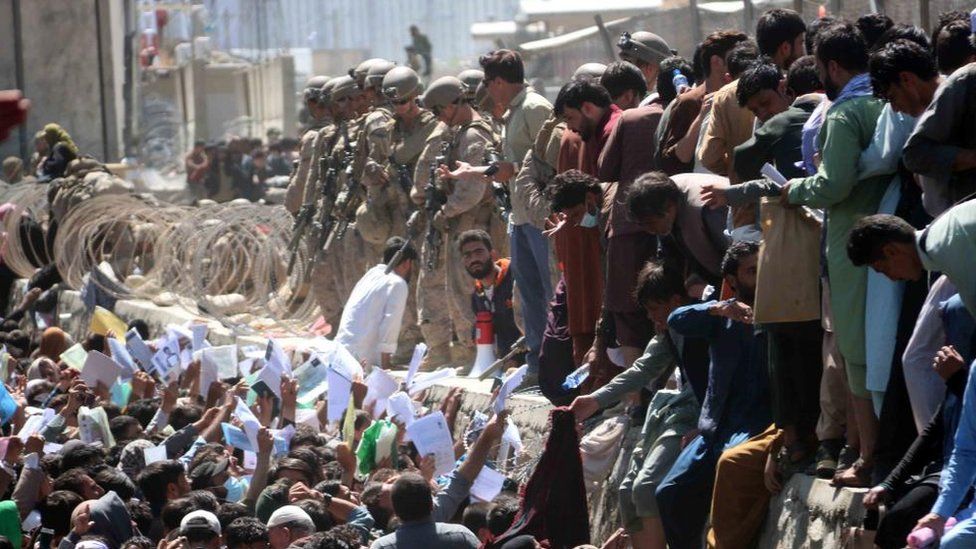
The Islamic State group mastermind thought to have planned the devastating 2021 bombing at Kabul airport has been killed by Afghanistan's ruling Taliban, US officials say.
The bombing that August killed 170 civilians and 13 US soldiers as people were trying to flee the country as the Taliban took control.
The IS figure was killed weeks ago but it took time to confirm his death, US officials told BBC news partner CBS.
His name has not been released.
US officials said they had determined through intelligence gathering and monitoring of the region that the leader had died, though they did not provide further details on how they had learned that he was responsible for the bombing.
"Experts in the government are at high confidence that this individual… was indeed the key individual responsible," a senior US official told CBS.
According to a report in the New York Times, the US learned of the leader's death in early April. It is unclear whether he was targeted by the Taliban or if he was killed during ongoing fighting between IS and the Taliban, the newspaper reported.
On Monday, the US began notifying families of the soldiers killed about the death of the IS leader.
Darin Hoover, father of Marine Staff Sergeant Taylor Hoover who died in the blast, confirmed to CBS that he had been notified of the news by the Marine Corps. "They could not tell me any details of the operation, but they did state that their sources are highly trusted, and they've got it from several different sources that this individual was indeed killed," Mr Hoover said in an interview on Tuesday.
The blast came hours after Western governments warned their citizens to stay away from Kabul International Airport, because of an imminent threat of an attack by IS-K, the Afghanistan branch of the Islamic State group.
It happened around 18:00 local time on 26 August 2021 at the Abbey Gate to the airport, when a suicide bomber walked into the middle of families waiting outside the gate.
Huge crowds had been gathering in the area, hoping to be accepted on to an evacuation flight as US troops pulled out of Afghanistan.
Among the casualties were two British nationals and the child of a British national, the UK government said at the time.
The US carried out a drone strike in Kabul days later, saying it had targeted a suicide bomber, only to admit that the missile had killed 10 civilians, including seven children.
They later offered a $10m (£8m) reward to anyone with information leading to the arrest or conviction in any country of those responsible for the attack, or for the capture of ISIS-K leader Sanaullah Ghafari.
The August 2021 pull-out of US troops from Afghanistan marked the end of America's longest war.
It led to the collapse of the Afghan government and military, which the US government had supported for two decades. It also led to the return of power to the Taliban.
The Biden administration was criticised both at home and abroad in the aftermath of the pull-out.
Many had expressed anger over the abandonment of Afghans and of US weaponry, and one US Marine injured in the blast described the pull-out as a "catastrophe" during Republican-led hearings examining the withdrawal.
Media caption,
Tyler Vargas-Andrews: "There was an inexcusable lack of accountability"
Michael McCaul, a Republican House representative, said the IS leader's death was welcome news but did not deliver full justice for the families of the US soldiers who died.
"If these reports are true, any time a terrorist is taken off the board is a good day," Mr McCaul said. "But this doesn't diminish the Biden administration's culpability for the failures that led to the attack at Abbey Gate."
President Joe Biden had directed a broad review examining the pull-out, which was released earlier this month. The review laid the blame on President Donald Trump for the deadly withdrawal, saying the Biden administration had been "severely constrained" by Mr Trump's decisions, including a 2020 deal with the Taliban to end the war.
No comments:
Post a Comment